1. Lucky Strike – “It’s Toasted”
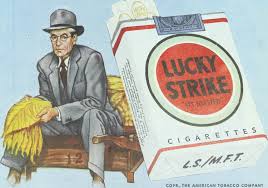
In 1917, Lucky Strike’s slogan “It’s Toasted” suggested a purer, safer smoke, but was really just smart marketing. By emphasizing “toasting,” the brand created the illusion of a healthier cigarette, even though the tobacco still held the same addictive chemicals and serious health risks. The companion slogan “Reach for a Lucky instead of a sweet” specifically targeted women, encouraging them to replace food with cigarettes as a weight-control strategy. That messaging helped the brand grow sales dramatically, increasing female smokers, while the company profited from addiction and disease.
2. Virginia Slims – “You’ve Come a Long Way, Baby”
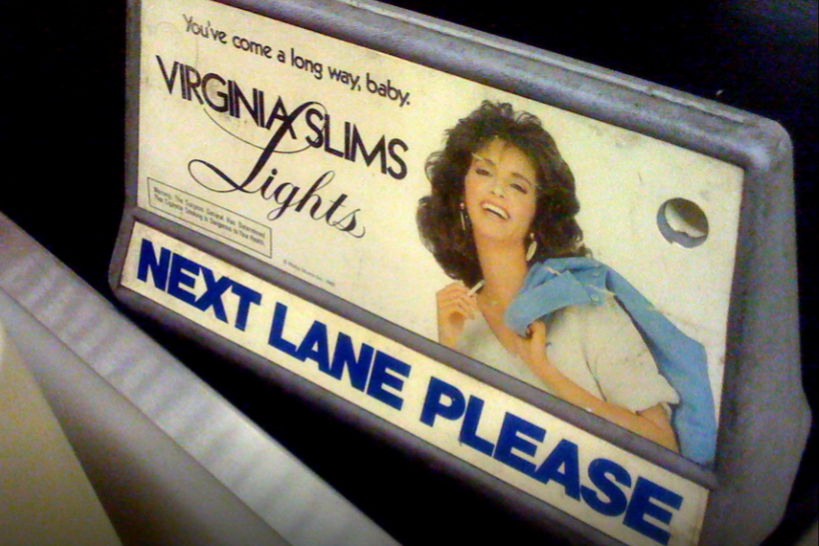
Virginia Slims launched with the slogan “You’ve Come a Long Way, Baby,” positioning itself as a badge of feminism, even though it sold cigarettes. The ads linked smoking to women’s liberation, casting the act as a symbol of independence and progress. In reality, Philip Morris designed the brand to lure a new demographic, young women, and rode the waves of the women’s rights movement to boost sales. Over time, the brand’s market share rose from 0.24 % to over 3 %, driven by aspirational imagery and empowerment narratives, despite growing evidence of health harm. By aligning with women’s rights, the tobacco industry masked its intent to hook female consumers just as it did with men.
3. Coca‑Cola – “The Pause That Refreshes”
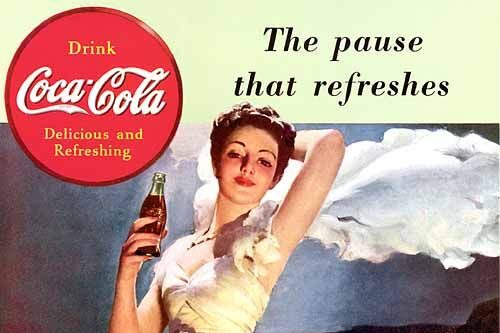
In 1939, Coca‑Cola’s slogan “The Pause That Refreshes” made drinking a Coke feel wholesome and relaxing, helping build one of the world’s most recognisable brands. It framed the product as a simple, innocent pleasure amidst daily life. Beneath that friendly image, however, was a company profiting from sugary drinks linked to obesity, diabetes, and environmental damage. Early formulas even included trace amounts of cocaine, and today Coca‑Cola is often criticized for its plastic waste footprint and impacts on water supplies in vulnerable regions. It reliance on single-use plastic bottles is contributing to pollution, and aggressive water usage that stresses communities with limited access to clean water supplies worldwide
4. Volkswagen – “Think Small”
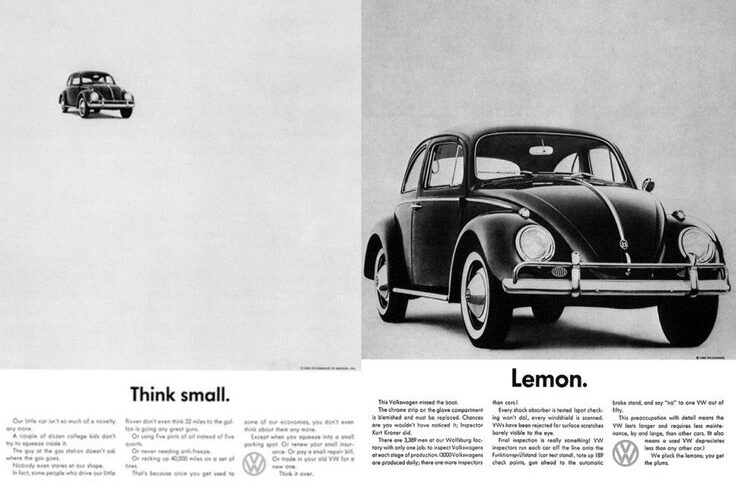
The “Think Small” 1959 campaign transformed advertising by celebrating modesty and simplicity, positioning Volkswagen Beetle as a smart, practical choice, especially in a market used to oversized cars. Yet the company’s origins are intertwined with Nazi Germany, where it was founded under forced-labor conditions; the company’s early earnings were intertwined with the Nazi regime and the use of forced labor in WWII. The Beetle project began under Hitler’s vision for a “people’s car,” and although the campaign broke through in the West, the brand carried heavy moral baggage from its origins. In other words, while the slogan made the Beetle iconic, its early profits and production were linked to exploitation and wartime atrocities, casting a long moral shadow over that cheerful tagline.
5. DuPont – “Better Living Through Chemistry”
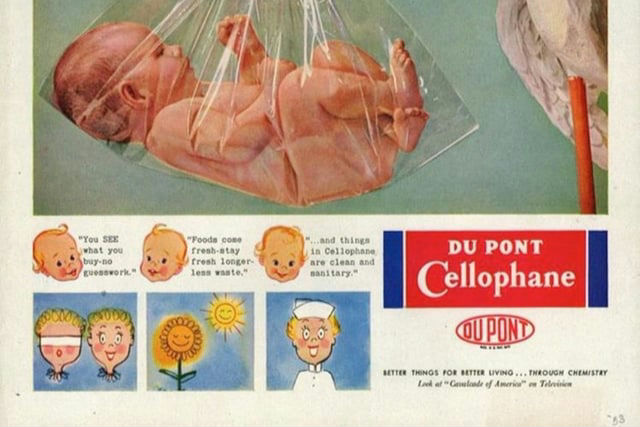
In 1954, DuPont’s confident slogan promised progress and innovation through chemistry, Teflon-coated cookware, new materials, and modern convenience. It shaped a mid-century narrative of chemical solutions improving everyday life. Over time, however, DuPont became infamous for widespread PFAS contamination (“forever chemicals”) that poisoned water supplies and harmed communities in places like Parkersburg, West Virginia. The company knew of health risks decades ago but buried evidence, and ultimately faced massive lawsuits and calls for accountability.
6. General Electric – “We Bring Good Things to Life”
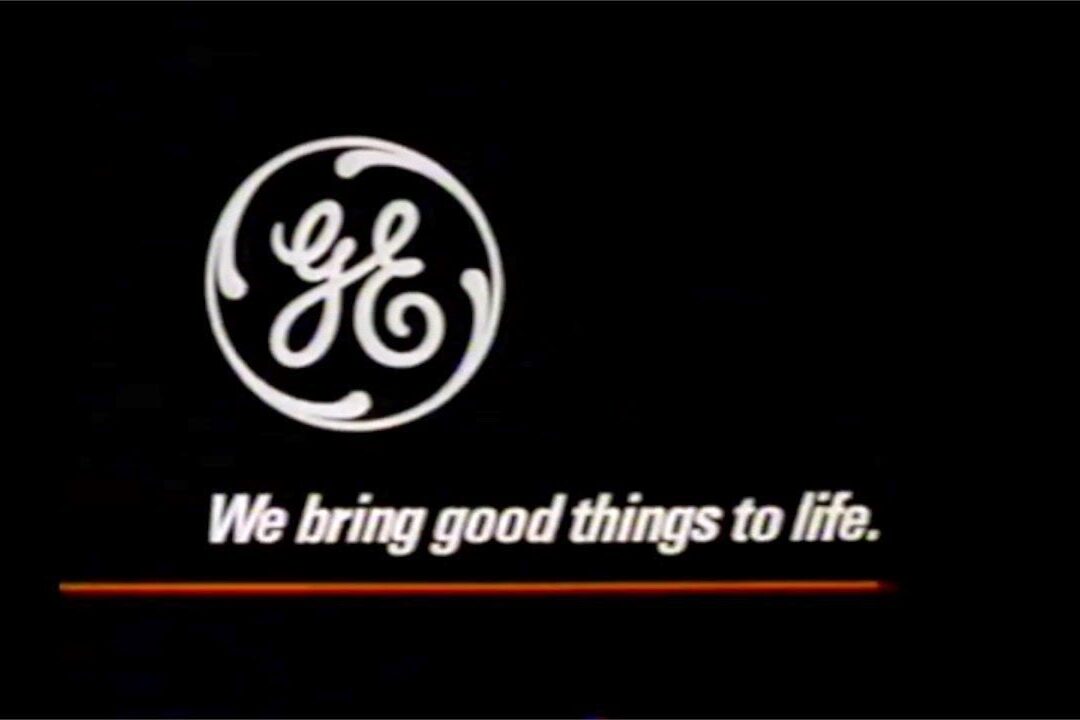
General Electric’s uplifting slogan “We Bring Good Things to Life” ran from 1979 until 2003, shaping a friendly and innovative image across lighting, appliances, and industrial products. The campaign, designed by BBDO, helped position GE as a modern, trusted household name, with consumers associating the brand with everyday convenience and technological progress. But beneath that optimistic message lay a dark environmental record: between about 1947 and 1977, GE discharged roughly 1.3 million pounds of PCBs, a known probable carcinogen, into the Hudson River from its Fort Edward and Hudson Falls capacitor plants. Those chemicals polluted nearly 200 miles of the river, leading to the entire stretch being designated a federal Superfund site in 1984. GE spent decades delaying cleanup through lobbying, ad campaigns downplaying health risks, and legal resistance, even as communities suffered from fishing bans and lingering contamination.
7. State Farm – “Like a Good Neighbor…”
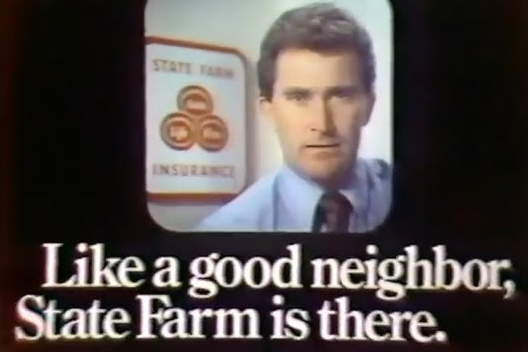
Written by Barry Manilow in 1971, State Farm’s slogan “Like a Good Neighbor, State Farm is there” built a reputation of reliability and support. For decades, customers trusted the brand to help after disasters, feeling confident they had a dependable protector on their side. In reality, that neighborly image has been tarnished by lawsuits and investigations. In California, regulators launched a probe into how State Farm handled wildfire claims from the January Los Angeles fires: many homeowners reported delays, excessive documentation demands, and outright denials, often in cases involving smoke contamination from lead or asbestos. A companion lawsuit alleges the insurer deliberately underinsured homeowners, misusing reconstruction‑cost software to minimize payouts while marketing policies as full coverage. Public accounts and investigations confirm claims were often mishandled, and customers left underinsured despite paying premiums.
8. Sprite – “Obey Your Thirst”
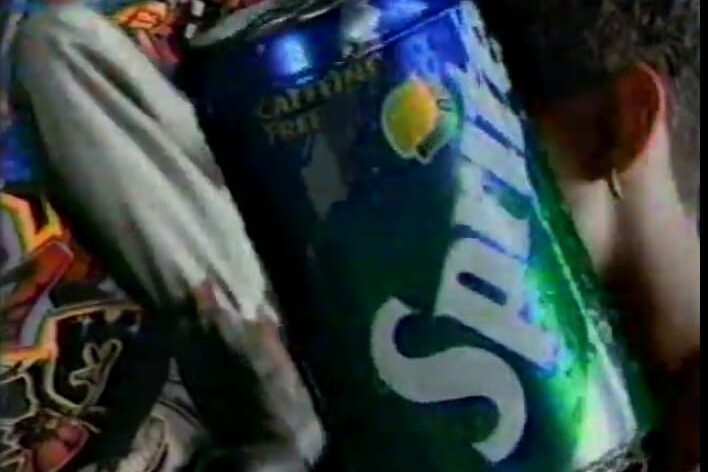
Obey Your Thirst” is the slogan for Sprite, a lemon-lime flavored carbonated beverage. It was first introduced in 1994 and relaunched in 2024, emphasizing individuality and passion. The campaign features prominent figures like NBA All-Star Anthony Edwards and track and field athlete Sha’Carri Richardson. Sprite’s edgy “Obey Your Thirst” campaign was aimed at youth culture, portraying Sprite as a rebellious, self‑expressive choice. It sells individuality and youthful freedom without the usual caffeine boost, making it feel modern and clean. But Sprite is full of high‑fructose corn syrup, a sugar‑heavy ingredient linked to obesity and metabolic disease. Coca‑Cola has used Sprite and similar drinks to target younger consumers with sugar disguised under branding that suggests refreshment, not calories.
9. L’Oréal – “Because You’re Worth It”
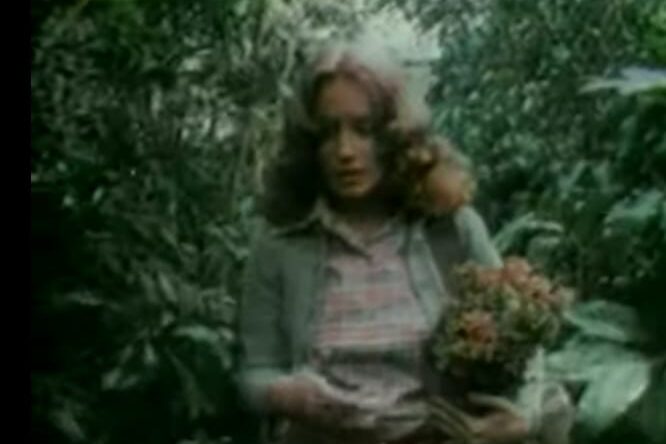
With a self‑worth façade, enforced beauty norms, L’Oréal’s empowering slogan “Because You’re Worth It” in 1973, is meant to promote self‑confidence and self‑value. On the surface, it sounds like a positive message of self‑care and entitlement to beauty. However, critics argue this empowerment is a commercial tool pushing narrow, Eurocentric beauty ideals, especially via skin‑lightening creams sold globally. L’Oréal has faced criticism for using retouched, whitened images of celebrities in ads and marketing skin‑whitening products that promote colonial beauty standards and pose health concerns from hazardous ingredients such as mercury and hydroquinone.
10. Wheaties – “Breakfast of Champions”
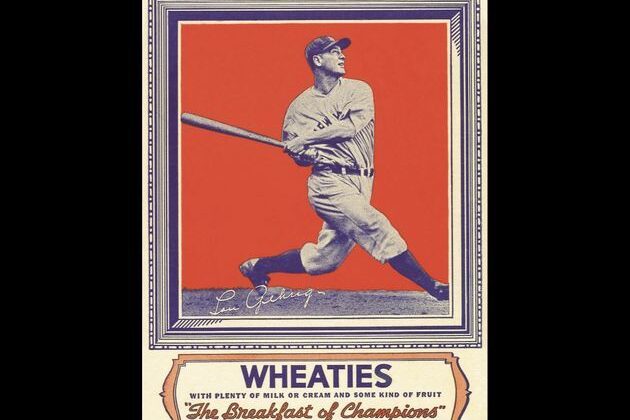
Through a Champion slogan on sugary cereal, Wheaties’ tagline “Breakfast of Champions” linked athletic mythos to breakfast routines, suggesting that eating Wheaties could be part of winning success. They featured athletes and heroes to reinforce the idea of performance and sporting excellence. This slogan is tied to the brand’s long history of featuring athletes on their cereal boxes, starting in 1934 with baseball player Lou Gehrig. Over the years, Wheaties has celebrated numerous champions across various sports, solidifying its association with athletic achievement. In truth, the cereal is mostly refined carbohydrates with added sugar and low fiber, far from a nutrition powerhouse. Despite the branding, it offers little in terms of modern nutritional standards, and even the brand’s decline has been blamed on its inability to modernize its health image compared to brands like Cheerios or Kashi.
11. Marlboro – “Come to Where the Flavor Is”
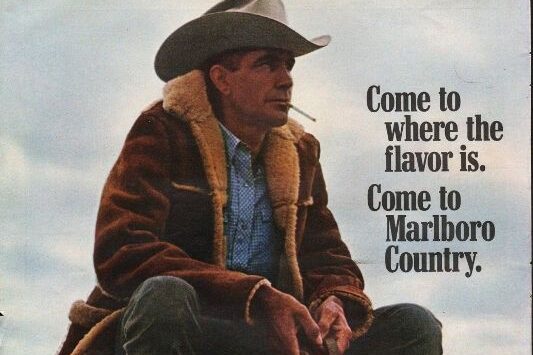
Marlboro’s iconic slogan “Come to Where the Flavor Is” (along with “Come to Marlboro Country”) debuted in the mid‑1960s as part of the legendary Marlboro Man campaign. With rugged cowboys in vast western landscapes, the ads sold a lifestyle of freedom, independence, and masculine vitality, appealing to both men and, unexpectedly, young women, transforming Marlboro into the world’s top cigarette brand by the early 1970s. Behind the appealing imagery, however, was addiction and illness. The “flavor” meant nicotine and tar packed into every cigarette, elements directly tied to lung disease, cancers, and millions of deaths. Studies estimate that Marlboro cigarettes have caused over 2.3 million American deaths since 1955, with more to come in the following decade. Even the actors behind the Marlboro Man were not exempt: at least four had died from smoking-related illnesses like lung cancer and COPD, including Wayne McLaren and Eric Lawson.
This 11 Companies That Nailed the Slogan, And Hid a Darker Story story was first published on Daily FETCH


